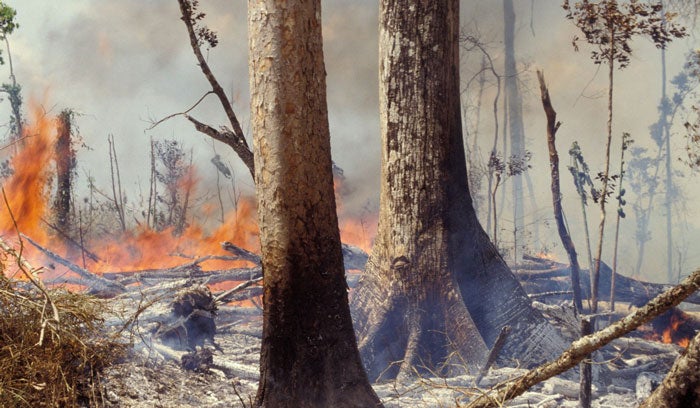Destruction of rainforest accelerates despite outcry

Your support helps us to tell the story
From reproductive rights to climate change to Big Tech, The Independent is on the ground when the story is developing. Whether it's investigating the financials of Elon Musk's pro-Trump PAC or producing our latest documentary, 'The A Word', which shines a light on the American women fighting for reproductive rights, we know how important it is to parse out the facts from the messaging.
At such a critical moment in US history, we need reporters on the ground. Your donation allows us to keep sending journalists to speak to both sides of the story.
The Independent is trusted by Americans across the entire political spectrum. And unlike many other quality news outlets, we choose not to lock Americans out of our reporting and analysis with paywalls. We believe quality journalism should be available to everyone, paid for by those who can afford it.
Your support makes all the difference.The destruction of the Amazon rainforest has surged in the past four months, raising the prospect of 2008 being a disastrous year for the world's most important eco-system, a senior Brazilian government scientist has warned.
Dr Carlos Nobre, a scientist with a government agency that monitors the Amazon said thousands of square miles of rainforest had been destroyed since October, after four years in which deforestation rates had begun to slow.
"I think the past four months is a big concern for the government and now they are sending people to do more law enforcement," Dr Nobre, told a seminar in Washington yesterday. "But I can tell you that it [deforestation] is going to be much higher than 2007."
The claims from the head of Brazil's National Institute for Space Research appear to undermine the government's record on environmental protection and come in the same week as a major report was released detailing the growth of cattle ranching in the Amazon.
Dr Nobre said 2,300 sq miles of forest had been lost in the past four months. That compares with an estimated 3,700 sq miles in the 12 months that ended on 31 July, which Brazilian officials hailed as the lowest deforestation rate since the 1970s.
Those figures had already been hotly disputed by conservationists who point to increasing pressure from sugar cane plantations to feed the ethanol boom, illegal cattle ranching for beef exports, soybean production and illegal logging operations. "All those drivers of change are there," said Dr Nobre. "The three years of reduced deforestation... did not bring by themselves a cure for illegal deforestation."
Roberto Smeraldi, from Friends of the Earth Brazil, said the surge was part of the same cycle of destruction that has seen so much of the forest cleared in the past. "We had a real overdose of deforestation between 2002 and 2005, which led to abundant availability of cleared land," he said. "Now this land has been occupied, the process heats up again."
Friends of the Earth released a report this week which revealed that 74 million cattle are reared in the Amazon basin where they outnumber people by a ratio of more than three to one.
Deforestation has emerged as the second leading source of the carbon emissions driving climate change. Brazil is now among the four main carbon polluters in the world and deforestation accounts for more than three quarters of its emissions.
Despite its acknowledged role as one the largest carbon sinks on the planet, its unrivalled biodiversity and the fact it stores half the world's fresh water, one fifth of the Amazon basin has been destroyed in recent years. There are serious concerns that the very survival of the world's largest rainforest is threatened and, last month, the WWF published research suggesting the Amazon could be wiped out by 2030.
A record drought two years ago reduced the Amazon to less than a trickle in large sections and fires last year, caused in part by forest-clearing for ranches, scattered tonness of ash over Brazil, Bolivia and Paraguay.
Now in his second term Brazil's President, Luiz Inacio Lula da Silva, has made a series of commitments to safeguarding the Amazon and his Environment Minister, Marina da Silva, has been feted for her stance on conservation.
But there is serious criticism of the government's record: that it has tended to favour industrial growth over environmental concerns. President Lula's administration has signed off on a rash of questionable infrastructure projects.
"Infrastructure is associated with aggressive and progressive land use change," said Dr Nobre.
Amazon threats
Cattle Ranching
New industrial slaughterhouses in the Amazon basin, funded in part by the World Bank, arefuelling the number of ranches, with cows now outnumbering people by 10 to 1 in some of the northern states.
Soya farming
Surging demand from Europe encouraged agribusiness giants to set up illegal ports on the Amazon river and facilitate massive forest clearance to plant the bean. A fragile moratorium on Amazonian soya has been declared after adverse publicity for the food giants.
Illegal logging
Always in the front line of deforestation, the loggers clear the way for the cattle ranchers and farmers to follow in a vicious cycle that has alreadyconsumed one fifth ofthe rainforest.
Biofuels
Rocketing oil prices mean the ethanol boom is here to stay. The government insists that sugar cane plantations won't eat into the Amazon but history shows that every agricultural boom in Brazil pushes prospectors deeper into the Amazon.
Join our commenting forum
Join thought-provoking conversations, follow other Independent readers and see their replies
Comments